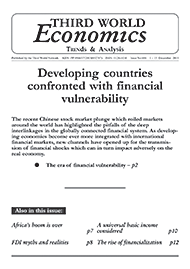Issue
No. 606, 1-15 December 2015
Developing countries confronted with financial vulnerability

*Click on cover
to download (PDF)
The
era of financial vulnerability
The crash in stock markets in China and around the world shows up
how developing countries are increasingly vulnerable to financial
events or shocks, including outflows of foreign funds.
by Martin Khor
Development
aid on the decline, warns new study
Development aid budgets in Europe are being diverted to cover the
costs of hosting refugees.
by Thalif Deen
Philip
Morris v. Australia: A big win for public health
Australia has warded off a legal challenge by tobacco giant Philip
Morris against the country’s landmark “plain packaging” laws aimed
at curbing cigarette consumption. But the broader danger posed by
international treaties which enable corporations to contest such public
interest measures remains.
by Kavaljit Singh
Opinion:
Africa’s boom is over
To boost their development prospects, Africa’s faltering economies
need to turn to industrial policy, but today’s trade and investment
agreements are restricting their ability to do so.
by Rick Rowden
Opinion:
FDI myths and realities
To derive benefits from inflows of foreign direct investment, developing
countries need policy flexibility to manage such flows – flexibility
that is fast being undermined by a slew of bilateral investment treaties.
by Yilmaz Akyüz
Opinion:
Controlling capital
Combating inequality demands restrictions on the flow of capital across
borders.
by Jesse Griffiths
Opinion:
A universal basic income considered
A
basic income for all could lift millions out of poverty – and change
how we think about inequality, writes Ralph Callebert.
Analysis:
The rise of financialization
Financialization has drawn into its expanding orbit non-financial
firms and the average household, with detrimental impact on production,
employment and inequality. The following extract from a Transnational
Institute publication on financialization explores the consequences
of this phenomenon, the factors behind its ascendancy, and how it
can be resisted.
